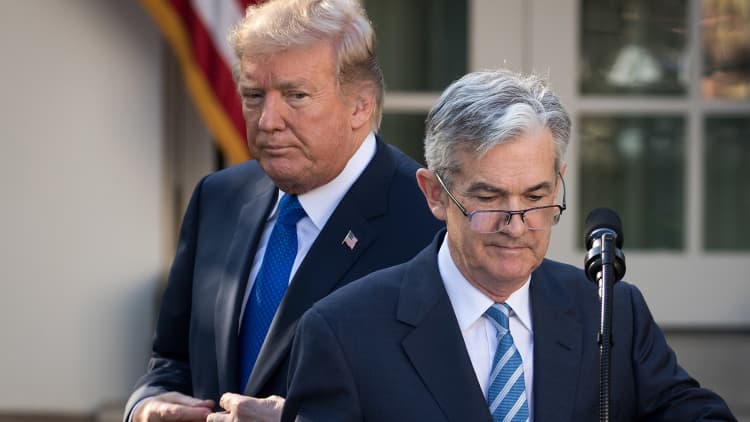
Federal Reserve Chairman Jerome Powell, in a question and answer parley Wednesday with members of Congress, asserted a new "new normal" for the economy, took questions on climate change and dodged pretty much everything political thrown his way.
Some highlights from the central banker's foray onto Capitol Hill:
The new 'new normal'
Powell gave the economy generally strong reviews while speaking to the Joint Economic Committee. But he also observed the nature of what the Fed is up against as it tries to meet its mandates for full employment and price stability.
"I think the new normal is lower interest rates, lower inflation, probably lower growth, and you're seeing that all over the world, not just in the United States," he said.
The Powell Fed has cut rates three times this year, the first coming just eight months after a quarter-point hike, the last of four in 2018. The benchmark funds rate that banks charge each other for short-term lending now sits in a range targeted between 1.5%-1.75%.
On one hand, Powell credited the Fed with helping stabilize the decade-long expansion. On the other, he said "we are closer than we would like to zero."
He also rejected the idea that the Fed might one day consider negative interest rates like those in place across Europe.
Climate change considerations
At least two committee members questioned Powell on whether the Fed is considering climate change when formulating monetary policy and in bank supervision.
While he noted that the issue is part of overall considerations about economic impacts and financial preparedness, he also said it's not central to the Fed's mission.
"Climate change is an important issue, but not principally for the Fed," Powell said. "It's really an issue that's assigned to lots of other government agencies, not such much the Fed."
The response is interesting in that the San Francisco Fed last week held a day-long seminar called "The Economics of Climate Change." Fed Governor Lael Brainard delivered remarks in which she said "it will be important for the Federal Reserve to take into account the effects of climate change" when setting policy.
The politics of policy
Powell also faced at least two occasions where members tried to pull him into commenting on political issues.
Texas Republican Sen. Ted Cruz tried several ways to get Powell to comment on the tax plans of Democratic presidential hopefuls.
"I'm pretty reluctant to be pulled into the 2020 election, if you will forgive me," Powell responded. "Indirectly, as you stated in your question, it's about proposals of candidates. I honestly don't want to get into that business."
Earlier in the session, Virginia Democrat Rep. Don Beyer asked Powell about the relentless criticism the Fed has received from President Donald Trump, most recently during an appearance Tuesday in New York.
"We have a very careful, thoughtful process that's been developed over decades — over a century really. That's how we try to set interest rates," Powell said. "We don't consider political factors or anything like that in anything we do."
Speaking of China
Rep. Tom Cotton, an Arkansas Republican, questioned the Fed chair on his opinion regarding China's economic growth.
Only Cotton used his fingers to make air quotes around "growth," citing research from economist Michael Pettis asserting that there was very little growth at all in China, despite the nation's insistence that its GDP is rising at a 6.2% pace.
Powell said it's "really hard to know" what's happening in China and said Fed officials are cautious when viewing economic information from there.
"We do take it with a bit of a grain of salt," he said of Chinese data.
Repo 'under control'
September's tumult in the repo markets, where banks get their overnight funding, also came up during the hearing, and Powell sought to assure members that the Fed has taken proper steps.
A cash crunch in the market saw yields surge, with the Fed's benchmark funds rate briefly going above its target zone. Since then, the Fed has instituted temporary and long-term programs aimed at keeping rates in check and making sure the finance operations are running smoothly.
"We're still very much looking at what happened in September," Powell said. "I think we have it under control."
He said the Fed has learned it has to keep bank reserves around the levels they were before the crunch happened. He also briefly mentioned that liquidity requirements have increased for banks.
"It's a process," he said. "It's one that doesn't really have any implications for the economy or the general public, though."


